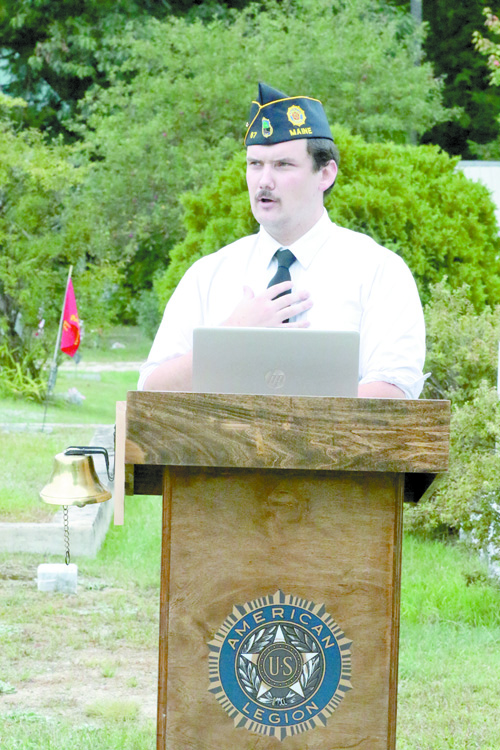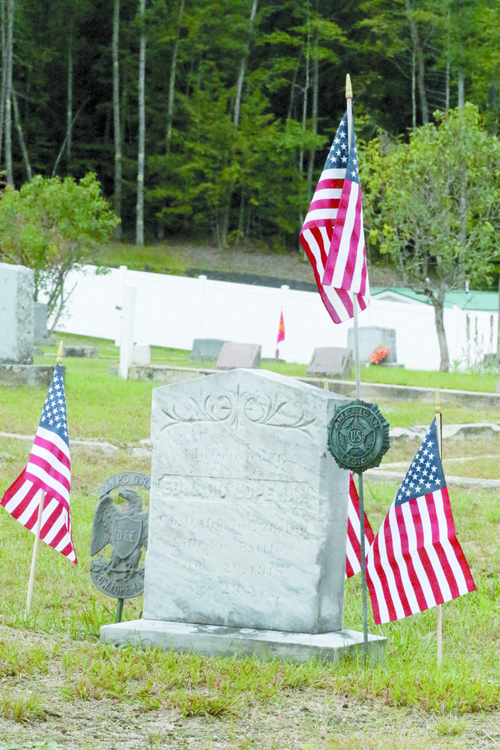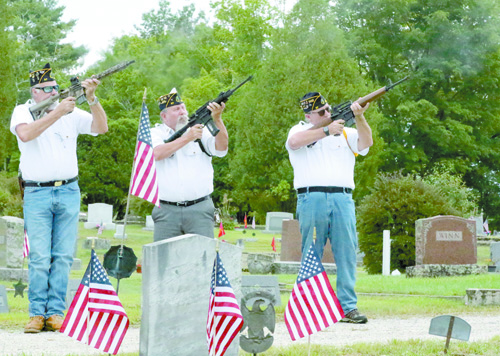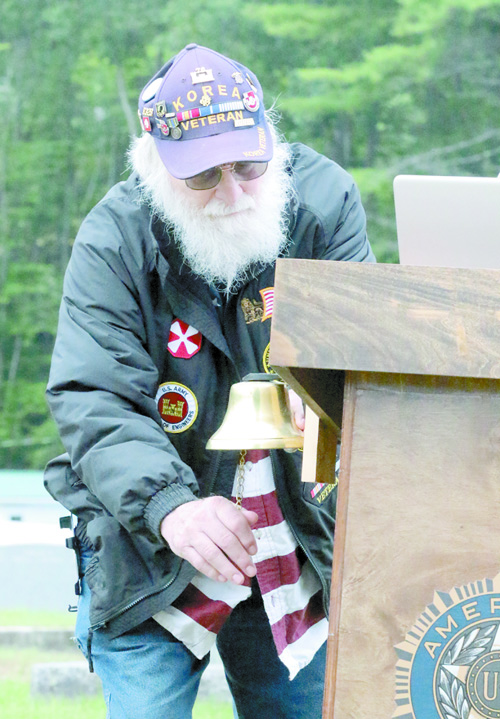Post 67 honors the life of Edward Lopeman; remembers lives lost on 9/11

Heroism transcends multiple generations, Liam Opie noted as American Legion Post 67 honored the life of Edward Lopeman, whom the local Post is named, and the lives lost (2,977 fatalities) on 9/11 to terrorist attacks in 2001.
A brief ceremony was held in the Forest Hills Cemetery on Kansas Road Sunday morning. Opie, who is the Post’s first vice commander, read the following memorial speech:
Good morning friends of Bridgton.
Remembrance is the one word that marks our event today, so this speech comes with some history that follows a hundred years. It begins not where you may think it does. Actually, let us travel back to the Bridgton of the past, specifically in 1895. In that year, a young infant destined by providence to become a hero was born. His name was Edward Lopeman.
Lopeman was born in Bridgton on Sept. 16, 1895, the third of nine children of William and Rose (Douglass) Lopeman. Edward’s father William was born in St. John, New Brunswick, the son of Irish immigrants. His mother’s side was deeply rooted in West Bridgton. Edward’s Uncle, Samuel Douglass, served as a wagoner in Georgia during the Spanish American War. His maternal grandfather Daniel Hill Douglass fought in Company G, 11th Maine Infantry during the Civil War, during which time he was wounded. That grandfather and uncle are buried in the top left corner of this cemetery too. As far back as the birth of our free nation, Edward Lopeman had ancestors who bore arms for the United States. His great-great grandfather John Douglass was a Revolutionary War veteran, serving in the 13th Massachusetts Infantry from 1779-1782.

Edward himself continued his maternal family’s tradition of military service. He enlisted at Norway, Maine to serve with Company D, Second Maine Infantry Regiment, on June 21, 1916. He served four months of active duty on the Mexican border at Laredo, Texas, and was mustered out of active service at Augusta in October of the same year. He remained with his National Guard outfit long enough to be ordered again to active duty, once the United States entered World War One on April 6, 1917. The company first served at Saco, shortly after it joined the 103rd Infantry Regiment. On May 4, he was promoted to private first class. After a few months stateside, Edward proceeded “Over There” to France on September 25. He was a part of the 26th “Yankee” Division, which were some of the first American soldiers to reach the frontlines.
Edward served gallantly during the next nine months. While fighting near Champagne-Marne, he was gassed near Saint Agnant. He was sent to the hospital, and recovered in time to join his unit for the Battle of Aisne-Marne. Unfortunately, on July 20, 1918, Private First Class Lopeman was killed in action, and made the ultimate sacrifice for his country. He was initially buried in France, but in 1921 his remains were brought back to his native Maine. Now, Edward Lopeman is buried with his parents and siblings in Forest Hill Cemetery, Bridgton.
Based on his service record, Edward Lopeman was eligible for two awards of the Purple Heart, the Mexican Border Service Medal, and the World War One Victory Medal with the Champagne-Marne and Aisne-Marne battle clasps.
Like so many others, Edward Lopeman was buried overseas in France. However, the Lopeman family would see to it that he came home. In late August of 1921, his remains were brought back from “Over There,” and returned to American soil.
Knowing the importance of remembrance, Bridgton’s two-year-old American Legion Post rose up to honor their fallen comrade. They were not alone, as the town came out to honor this hero. Let me share some brief details about the memorial event for Lopeman that took place on Sept. 11, 1921, exactly 101 years ago. At 9:30, his casket lay in state at the Town Hall on North High Street, guarded by members of the American Legion. Flowers were laid around him, and flags throughout the town were put at half-mast. At 2:30, the public services began for him, led by several ministers of the gospel. Following prayers and presentations of his military service, it was time to bring Edward Lopeman to his final resting spot.
By open car, he was brought down to this spot, escorted by the Legion and several other orders, such as the Grand Army of the Republic and the Independent Order of Redmen. Noble veteran and goodwill organizations like these two had come out to support this young man.

At the grave, a moment of silence was offered, a rifle squad gave an appropriate salute, and taps were played. He was committed to this very earth, and then the procession proceeded back to the Legion Hall.
As I read articles about this solemn event in the old Bridgton Newsarticles, I came across a line that connected a few points in my head.
“The orders were formed about the grave, and a very large number stood in silent respect during the impressive service for who typified not only all the Bridgton boys who gave their lives, but the great sacrifice of America and the world.”
As I researched this event, I came to realize that it was held on September 11, 1921, exactly 80 years before America’s greatest tragedy — the attacks on our soil in New York, Pennsylvania, and Virginia, better known today as 9/11.

I need not share all the details of the tragic day. You folks gathered here remember it well, whereas I was just a young child. However, I want you to consider the connection of the attacks with the tragedy years earlier of Lopeman’s death. Personally, I realized that despite being different eras, the tragedies of the First World War and 9/11 were connected in that one end line in the previous quote: The “Great sacrifice of America and the world.” 2,977 American men and women lost their lives at the hands of evil that day. 116, 516 men and women were killed in the First World War, too. Lopeman is our personal representative here in Bridgton of the great sacrifice of Maine in WWI, and indirectly joins our remembrance of those who perished on 9/11 today.
Thus, please remain silent as we toll the bell for the six Mainers who were killed in the attacks on the World Trade Center, and the Pentagon — Robert Jalbert, James Roux, Robert Norton, Jacqueline Norton, Robert Schlegel, Stephen Ward.
Riflemen, please render two volleys for our important heroes. This first volley will honor Edward Lopeman, and the second will honor our Mainers killed 21 years ago today. Following this, I ask that we all take a brief moment of silence to let the echoes of the sacrifices of these brave Americans ring in your hearts, along with the echoes of our rifles.
As you go forth today, never forget the memory of Edward Lopeman, those lost on 9/11, and the bravery of American spirit that has lasted for centuries, and can never be vanquished, whether on the fields of Chateau Thierry, the World Trade Center, or on the airport of Kabul, Afghanistan in August of 2021.
Lives may be lost, but American heroism will last forever!


